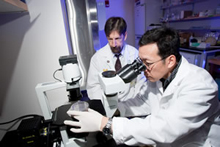Scientists at the University of Michigan, Ann Arbor, have identified a mutant gene protein in animal pancreatic beta cells that can thwart normal insulin production. Published online October 11, 2010 in the journal PLoSOne, the study focused on the neonatal form of non-autoimmune type 1 diabetes, but the findings may play a role in type 2 diabetes as well.

U-M diabetes researchers Peter Arvan and Ming Liu, photograph courtesy of the University of Michigan
Researchers introduced single gene mutations of neonatal diabetes in cultures of normal rat and mice beta cells. Findings concluded that misfolding occurred in normal proinsulin protein (the precurser to insulin protein) when mutant proinsulin protein was present. They observed these same deviant events in the pancreatic beta cells of Akita mice, a mouse model with the same mutation that occurs in humans with neonatal diabetes.
According to Peter Arvan, MD, PhD, director of the Michigan Comprehensive Diabetes Center and the study’s senior author, “Once the ‘good’ proinsulin turns ‘bad,’ it cannot be made into insulin and so the beta cells, and then the whole animal, become insulin deficient. The insulin deficiency causes diabetes, and from there, things get worse and worse.”
Arvan added, “In all diabetes, beta cells don’t perform to the level needed. It’s possible that the beta cell failure of type 2 diabetes also has a critical protein folding component…. The question is, can you reach a point in ordinary diabetes where misfolding causes the problem we have identified?”
The authors claim that uncovering the earliest events in the molecular mechanism of the disease may help diabetes researchers discover new therapies. New drugs that could emerge would be at least several years away, they said.
“It may be possible [for a new drug] to find a way to modulate the environment in the endoplasmic reticulum to let the normal protein fold quickly, before the abnormal protein can act,” said Ming Liu, MD, PhD, the study’s first author and a research assistant professor of internal medicine at the U-M Medical School.




